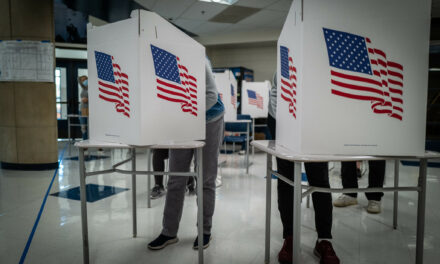We support our Publishers and Content Creators. You can view this story on their website by CLICKING HERE.
Amid the aftermath of the catastrophic Hurricane Helene, Americans have been reminded that the federal government’s prioritization of some citizens over others extends even to disaster relief, given recent revelations of FEMA’s emergency management blueprint to “instill equity as a foundation of emergency management.”
Not that we should be surprised: The Biden administration constantly claims white supremacist domestic terrorists are the greatest danger to our republic, while the FBI warns that the top domestic violent extremist threat is “racially or ethnically motivated violent extremists, specifically those who advocated for the superiority of the white race.” Left-wing corporate media have insisted that the 2024 presidential election is, at its heart, a battle over whether America will return to an alleged white supremacist, misogynist past.
Such assertions, at least implicitly, are grounded in a belief that tribalism — the prioritization of and extreme loyalty to one’s group, be it ethnic, racial, or sexual — is ultimately a destructive force in politics because it engenders fear, resentment, and, in its most extreme form, violence.
Yet it doesn’t require much reflection to appreciate that tribalism, far from being a competitor to liberal ambitions, is actually the most potent weapon Democrats wield to generate energy among their base, stoking the very identity-driven animosity that Vice President and 2024 candidate Kamala Harris appeals to when she declares: “We are not going back.” Yet even a cursory review of how mankind slowly labored to overcome its naturally inclined tribalism in favor of respect for all peoples indicates which political ideology is fueling the dangerous identitarianism of our day.
Tribalism Was Once the Default of the World
It’s easy to forget that for most of human history, tribalism was the default position, as John M. Ellis argues in his book A Short History of Relations Between Peoples: How the World Began to Move Beyond Tribalism. One can see this in the fact that the names of many people groups translate to a word or idea translating to the people, such as the Navajo (Diné), Cheyenne (Tsétsêhéstâhese), Germans (diota), and the Bantu peoples of sub-Saharan Africa. As scholar Robert Edgerton observes: “People in many societies refer to themselves as ‘the people’ and regard all others as alien and repellent.”
This explains why for much of human history people groups exhibited little concern with displacing, enslaving, and even massacring other foreign peoples — if your own tribe is the true humans, and everyone else is fundamentally different and perhaps even subhuman, then few obstacles remain for mistreating or annihilating them.
Alternatively, this is also the reason why humans throughout our history have exhibited a natural fear and suspicion of foreigners — for these are exactly the kinds of people most likely to seize your land, steal your possessions, and kill you. People who look like you or speak your language are probably your kin and governed by similar mores; those who dress differently or communicate in a strange tongue, especially if they arrive well-armed on your border, are the ones you need to worry about.
What was it then that altered perceptions and practices that had been cultivated for millennia across the many cultures and civilizations of the world? Ellis argues that it was a confluence of factors originating out of Europe beginning in the 16th century that dramatically transformed the world and began promoting the idea of gens una summa: that all of us, regardless of ethnicity, language, or race, are a single humanity possessing a shared, inherent dignity.
The Age of Discovery, for example, brought many previously isolated groups into communication across the continents of the world. The Christian missionaries who accompanied European explorers, in turn, sought to convert non-Christian peoples in the Americas, Africa, and Asia. Obviously, one does not baptize and catechize nonhumans, so even if imperial powers often (to their shame) subjugated and exploited new societies they encountered, the very act of attempting to Christianize them reinforced an indelible premise that they were indeed humans worthy of the same respect and rights as their European counterparts. Literacy too played an integral role in this development, as books about distant, foreign civilizations could not help but progressively humanize them in the minds of readers.
But It’s the Left That Wants to Go Back
Though European interaction with the rest of the world is now presented as a story of evil, exploitative plunderers and subjugators who terrorized the rest of the globe, this is grossly incomplete and deeply misleading. For it was Europeans who brought many of the civilizational advances now taken for granted to every corner of the globe, among them literacy, the scientific method, modern medicine, electricity, refrigeration, and representative government. As much as the academy and media deride Western influence over the world as “colonialism,” few such Western haters would declare their desire to return to a premodern world free of books in their vernacular language, vaccinations from deadly illnesses, or global supply chains so that we may no longer suffer the continued effects of white “imperialism.”
Undoubtedly, it was the West that proposed a world capable of transcending close-minded tribalistic tendencies cultivated over many generations, a new vision for humanity — what Thomas Jefferson and Abraham Lincoln celebrated as the “equality principle” derived from Christianity and scientifically informed natural law reasoning.
Yet, as many of us can keenly observe, America is increasingly devolving into a more tribalistic society, in which racial and sexual identitarianism matters more than our status as fellow citizens. Ellis right argues that the tribalism of our day — manifested in critical race theory, DEI, and virulently anti-masculine feminism — corrupts university curricula, interferes with free speech, undermines professional training and competence, poisons our politics, and endangers the safety and security of our communities.
Thus it is no surprise that the Democrats’ electoral movements and sloganeering — “White Dudes for Harris,” “Win With Black Women,” “Bans Off Our Bodies,” and the bizarre, celebratory obsession over “childless cat ladies” — are all extensions of this tribalist identity politics. The left’s ideological project, whether in the academy, media, entertainment industry, business world, or our justice system, is motivated, at its core, by sentiments aimed to accentuate, not minimize, tribalism. It champions a complex woke hierarchy that determines who possesses the most political and social capital, with “intersectional” racial and sexual minorities at the top and, as so many federal policies suggest, cisgender white males at the bottom.
Contrary to the vision of the founders and Lincoln, we are “going back” to a paradigm of fear, resentment, and tribalist conflicts — and Democrats have only themselves to blame.
Casey Chalk is a senior contributor at The Federalist and an editor and columnist at The New Oxford Review. He has a bachelor’s in history and master’s in teaching from the University of Virginia and a master’s in theology from Christendom College. He is the author of The Persecuted: True Stories of Courageous Christians Living Their Faith in Muslim Lands.

 Conservative
Conservative  Search
Search Trending
Trending Current News
Current News 





